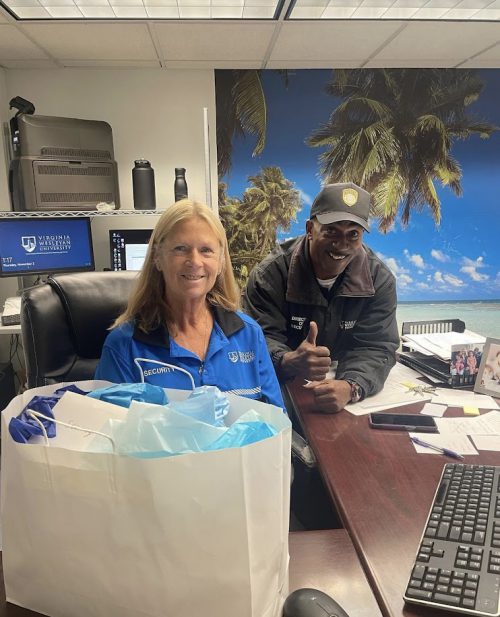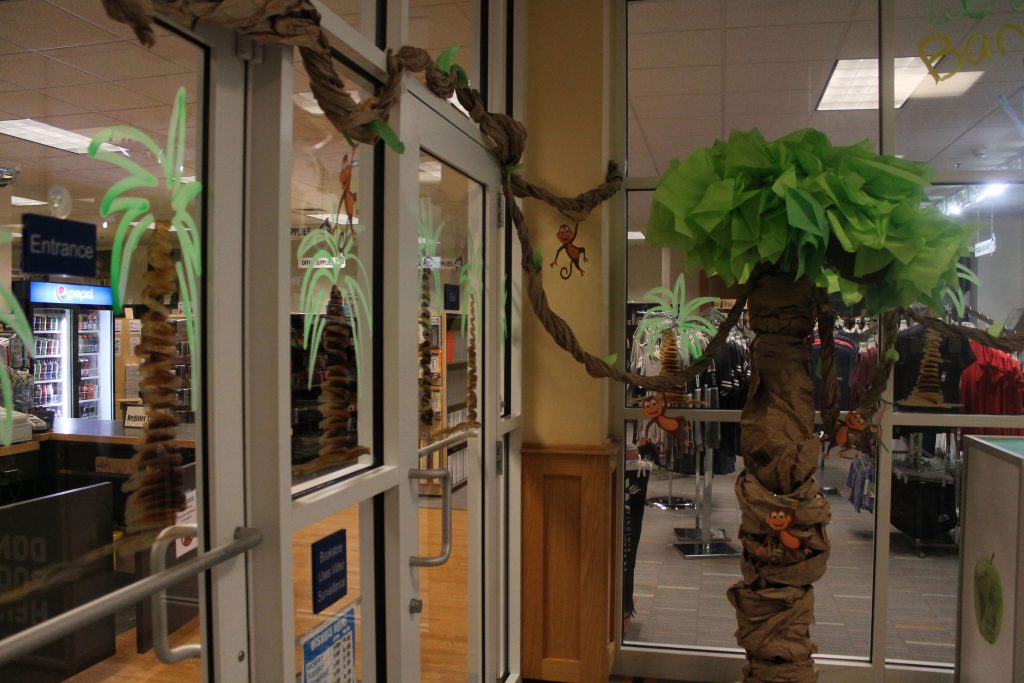Featured Image: Security officers receive a gift from SGA. SGA|Courtesy
VWU practices sustainability through used cars and biodegradable disposable goods, while weighing electric vehicles.
From new security vehicles to coffee grind composts and biodegradable tampons, VWU always aims to lead a sustainable and safe example. As a part of VWU’s Environmental Guiding Principles, the University is committed to serving the coastal environment it is a part of by leading with sustainability, stewarding campus resources and promoting environmental responsibility in students.
According to the Principles, “The ongoing sustainability efforts of the University reflect a larger commitment to ethical conduct and social responsibility through environmental stewardship and education.”
This commitment to the environment is reflected in various initiatives the University implements to foster sustainability within, and beyond, the Marlin community.
“Ultimately, we want to go green,” Senior Vice President Keith Moore said. “But safety is number one because when it comes down to it, you’re here to learn, but your safety is primary.”
In an attempt to “go green” while promoting safety, VWU has recently added a newer, somewhat more sustainable vehicle to its security fleet. The vehicle previously belonged to a retired fire marshal, so it came to VWU already equipped with all the necessary equipment. This vehicle replaces the previous two vehicles that made up the fleet, both of which had between 200,000 and 300,000 miles on them.
As administrators were in the process of locating a new vehicle, the Student Government Association (SGA) suggested that the vehicle be eco-friendly. However, the lack of charging ports and limits of the budget did not allow for the new vehicle to be hybrid or electric.
“We cut our fleet in half, so that is more economical and better for the environment. But looking into the future, we are looking to add charging stations to new construction,” Moore said. “I’m working with Dominion Power right now and have been for about four months on adding stations to new construction. Right now, we know that demand is not something that is there quite yet, but it’s heading that way.”
When it comes to purchasing security vehicles, VWU usually looks for public safety companies or departments that are selling used vehicles. This has partly played a role in the fact that the new security vehicle is not electric or hybrid, despite SGA’s suggestions.
“We typically buy vehicles from another company, but the electric vehicles haven’t trickled down to us yet,” senior, member of VWU’s Environmental Sustainability Committee and President of SGA Eddie McDonald said. “We’re still buying vehicles that were bought five or six years ago that weren’t electric, so I would expect the next set of vehicles to be electric.”
Although VWU claims to have big plans to make advancements for electric vehicles in the future, these plans are not evident in their recent actions.
“If VWU would like to go above and beyond with their environmental standards, this addition of a non-hybrid or electric vehicle is not exactly the way to do it,” senior and Marlins Go Green President Cecelia Aten said. “Having a newer vehicle and only one vehicle is more of the bare minimum that VWU can do when trying to support a more environmentally friendly security fleet. The direction that the world is moving, involving environmentalism and sustainability, expresses the need for VWU to change their security fleet to hybrid or electric vehicles.”
The need for advancements may come even sooner, as electric and hybrid vehicles become more and more popular.
“As fully electric cars and plug-in hybrids are becoming more popular, universities are beginning to add charging stations,” Dr. Elizabeth Malcolm, professor of Ocean and Atmospheric Sciences and Director of Sustainability, said. “Virginia Wesleyan University is looking into options for adding charging stations, anticipating that residential students and visitors will need charging stations in the future.”
In the meantime, VWU aims to lead a sustainable example in other facets of the campus community. Student-led organizations, such as SGA and Marlins Go Green, make it their priority to leave a positive environmental footprint.
“[Sustainability] is always a focus of what we’re doing in SGA,” McDonald said. “I think Marlins Go Green has done an amazing job too, especially with the composting.”
Marlins Go Green partners with Sodexo to compost leftover food and give back to the environment. The organization stresses the importance of recycling and encourages students to utilize the recycling bins in the 24/7 Study area and under the stairs in the Greer Environmental Sciences Center.
Similarly, SGA follows initiatives in an attempt to make our campus more sustainable. One of these initiatives can also be found in the 24/7 Study lounge, where SGA has set up a free coffee station for students. Rather than providing single-use plastic cups, the station is stocked with biodegradable cups—a small but effective difference. SGA has also been researching vendors that provide eco-friendly and sustainable menstrual products. The organization hopes to provide students with these products in the near future.
Although there is still work to be done, VWU has recently taken the steps to become more sustainable and eco-friendly, as well as safe.
If you have ideas to make our campus greener or just want to lend a helping hand, keep up with the SGA and Marlins Go Green Instagram pages, @sga.marlins and @marlinsgogreen, respectively.
By Carey Seay
clseay@vwu.edu

